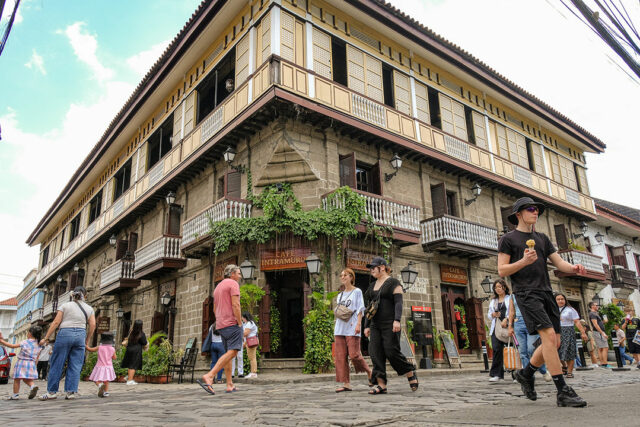Kickstarting the PHL’s Comprehensive Archipelagic Defense Concept: The role of the PHL-Aussie strategic partnership

In January 2024, Secretary of National Defense Gilberto Teodoro announced a new defense concept, the Comprehensive Archipelagic Defense Concept (CADC). The CADC is premised on the assumption that as an archipelagic country, the Philippines’ land mass is limited while its population is increasing, causing the need for resources to expand exponentially.
Since 2011, Manila has explored the prospect of surveying and exploiting the natural gas and oil deposits on Reed or Recto Bank, which is inside the country’s exclusive economic zone (EEZ). However, Mr. Teodoro observed: “The country’s resources in its maritime territory are illegally and unilaterally encroached upon by a country using a distorted nine-10-dash line, which nobody in the world accepts or recognizes since this would open a rewriting of international law. This is because China claims almost 90% of the South China Sea.”
The CADC requires the Philippine government to project the Armed Forces of the Philippines’ (AFP) capabilities in the Philippines’ EEZ and develop its strategic depth to enhance the defense of its archipelagic territory. This aims to address the Philippines’ strategic vulnerabilities and enhance the AFP’s capability to protect national interests through specific long-term plans. The AFP’s primary limitation is the inadequate naval and aerial assets of the Philippine Navy and Philippine Air Force. This strategic limitation can be attributed to the AFP’s continuous and protracted counterinsurgency campaigns that have shaped its trilateral structure, such as the Philippine Army, which has reconfigured itself to neutralize several insurgent groups since the late 1940s. The AFP urgently needs to develop its Maritime and Air Defense (MAD) capabilities to focus on the Philippines’ maritime and air domain, where the country has sovereign rights to explore, extract, and preserve the aquamarine environment and resources according to international law. An adequate, credible, and effective Philippine MAD is expected to protect, defend, and secure against foreign intrusion, extraction, and exploitation and to support law enforcement operations against transnational crimes within the country’s 200 nautical mile EEZ and 350 nautical mile continental shelf.
However, the implementation of the CADC faces two major obstacles: First, the prospective financial cost of this defense concept and the Filipino nation’s inclination to shoulder the enormous bill for the country’s expected increase in defense spending. Second, the willingness and capability of the US and its other treaty allies to assist the Philippines in jumpstarting and supporting the CADC, both technically and financially.
THE PHL-AUSSIE SECURITY PARTNERSHIP
Although an Indo-Pacific power, Australia is not directly involved in the South China Sea dispute. However, it has strategic interests in maintaining stability and order in the disputed waters. Canberra views Beijing’s expansion in this important strategic waterway as one of the dangerous flashpoints in the Indo-Pacific region. Canberra has voiced its grave concern over China’s construction and militarization of the artificial islands in the maritime domain, which the arbitral tribunal ruled as located within the Philippine EEZ. Australia has openly expressed that Chinese expansion and coercive actions against other claimant states in the South China Sea are grave threats to the freedom of navigation and the rules-based regional order.
This accounted for the dramatic improvement in Philippine-Australian security relations during the Duterte Administration. This improvement in the two countries’ security partnership was reflected in the following bilateral defense arrangements.: 1.) Australian Embassy Note 482/17 on Defense Cooperation between the AFP and the Australian Defense Force; 2.) Operation Augury – Philippines, 2017; 3.) the September 2018 Terms of Reference on Cooperation between the major services of the Philippines and Australian armed forces; and, 4.) the 2021 Philippine Australia Mutual Logistic Support Arrangement.
Under President Ferdinand Marcos, Jr., the Philippine-Australia security partnership has improved even more, with the administration adopting a firmer stance on the country’s maritime claims and doing much to publicize Chinese intrusion and coercive actions against the Philippines to the outside world.
In May 2023, Australian Foreign Minister and Senator Penny Wong’s four-day visit to the Philippines provided the impetus for developing the Philippine-Australian security partnership. She met Foreign Affairs Secretary Enrique Manalo to discuss issues of mutual interest, such as defense, security partnerships, development cooperation, trade and investment, and people-to-people ties. She announced initiatives to enhance maritime cooperation and more considerable official development assistance to the Philippines in 2023 and 2024. She said that maritime cooperation initiatives include technical assistance and capacity building for the Philippine Coast Guard; equipment, skills, and technology transfer to improve maritime domain awareness and marine protection; and assistance to mitigate the oil spill’s environmental impact off Mindoro.
On Sept. 8, 2023, President Marcos and visiting Australian Prime Minister Anthony Albanese signed a Joint Declaration on a Strategic Partnership between the Philippines and Australia in Manila. The new agreement effectively elevated the two countries’ security partnership from comprehensive to strategic. Several economic measures accompanied the upgrade of bilateral relations between the two countries. However, the security component drew the most attention, with the two US allies agreeing to convene an annual meeting of their defense ministers, and Australia confirming its commitment to hold joint naval patrols with the Philippines through the South China Sea.
All these developments point to Australia’s growing importance as one of the Philippines’ strategic partners, which is helping the AFP jumpstart the implementation of the CADC.
Dr. Renato Cruz De Castro is a trustee and convenor of the National Security and East Asian Affairs Program of the Stratbase ADR Institute.






















